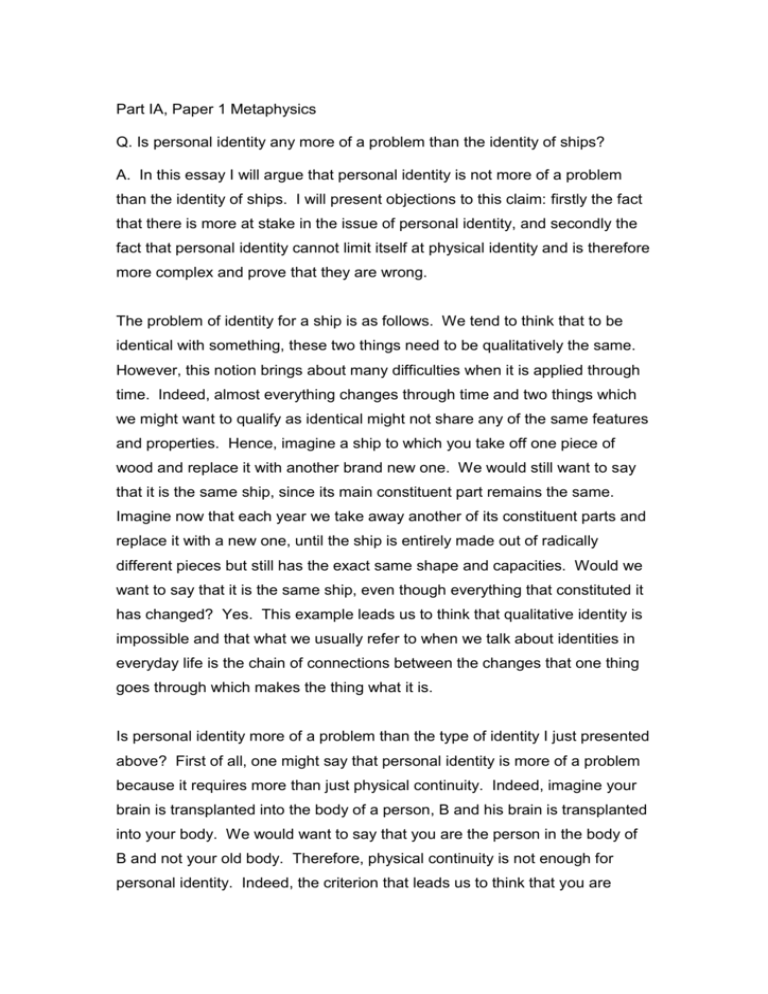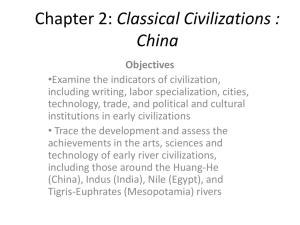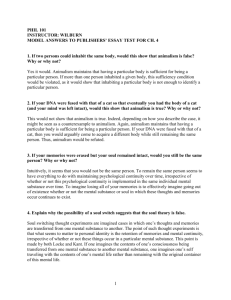2i/2ii borderline answer for Paper 1 Metaphysics (2)
advertisement

Part IA, Paper 1 Metaphysics Q. Is personal identity any more of a problem than the identity of ships? A. In this essay I will argue that personal identity is not more of a problem than the identity of ships. I will present objections to this claim: firstly the fact that there is more at stake in the issue of personal identity, and secondly the fact that personal identity cannot limit itself at physical identity and is therefore more complex and prove that they are wrong. The problem of identity for a ship is as follows. We tend to think that to be identical with something, these two things need to be qualitatively the same. However, this notion brings about many difficulties when it is applied through time. Indeed, almost everything changes through time and two things which we might want to qualify as identical might not share any of the same features and properties. Hence, imagine a ship to which you take off one piece of wood and replace it with another brand new one. We would still want to say that it is the same ship, since its main constituent part remains the same. Imagine now that each year we take away another of its constituent parts and replace it with a new one, until the ship is entirely made out of radically different pieces but still has the exact same shape and capacities. Would we want to say that it is the same ship, even though everything that constituted it has changed? Yes. This example leads us to think that qualitative identity is impossible and that what we usually refer to when we talk about identities in everyday life is the chain of connections between the changes that one thing goes through which makes the thing what it is. Is personal identity more of a problem than the type of identity I just presented above? First of all, one might say that personal identity is more of a problem because it requires more than just physical continuity. Indeed, imagine your brain is transplanted into the body of a person, B and his brain is transplanted into your body. We would want to say that you are the person in the body of B and not your old body. Therefore, physical continuity is not enough for personal identity. Indeed, the criterion that leads us to think that you are rather the person in the body of B than the person in your old body is psychological continuity. You are psychologically continuous with the person in body B in the sense that you share the same chain of psychological connection between different mental states and this is what makes you identify with B. However, does the fact that personal identity is based on psychological continuity rather than material continuity make it more of a problem? I do not think so since the fact that their continuity is different doesn’t make one more problematic than the other. Secondly, we might want to say that it is more of a problem in the sense that it matters more since persons need to know what their identity consists in to be accountable for their actions and to have some interest in the future. Indeed if one wants to act in order for something to happen to him and if the person their action affects is not him, why would he perform it? And why would someone be responsible of an action if he didn’t perform it? I will show that we do not need personal identity to have interest in the future and moral responsibility, and that therefore there is not more at stake in personal identity than in the identity of a ship. Imagine we split a person A’s brain in two hemispheres and transplant each into a different body: one in Body B and one in Body C. Both B and C will be psychologically continuous with A. However, do we want to say that both are identical to A? Certainly not, especially since persons B and C start leading different lives. Therefore psychological continuity is not enough for personal identity: it requires uniqueness since it is a 1-1 relation. However, B and C will plausibly still be responsible of A’s past actions since they are psychologically continuous with him. Therefore, one cannot be identical with another person and still be morally responsible for his actions in that sense. Therefore, there is not more at stake in the problem of personal identity. I have argued that personal identity is not more of a problem than the identity of ships since they are simply different in the nature of their continuity and one does not have more important issues at stake than the other.











